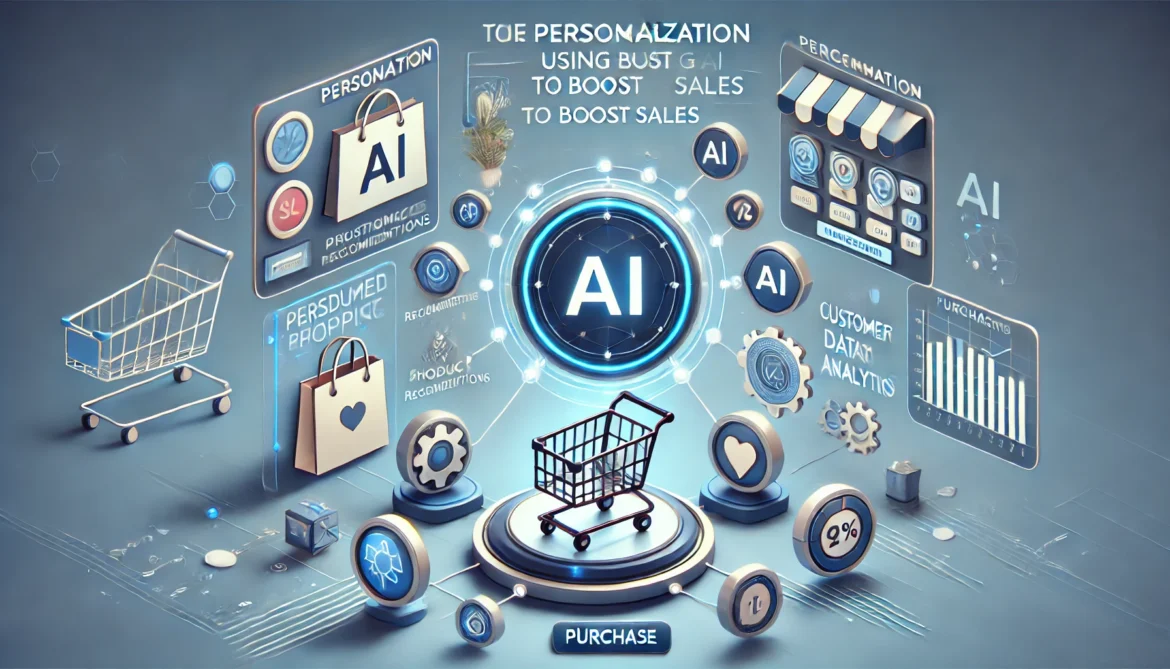Table of Contents
Customers expect more than just a transactional shopping experience—they want personalization. Personalization can turn casual browsers into loyal buyers, but achieving it effectively at scale is not easy. That’s where Artificial Intelligence (AI) comes in.
Let’s explore how AI can enhance personalization in your online store and drive more sales.
Understanding Personalization in E-Commerce
Personalization in e-commerce refers to tailoring the shopping experience to individual users based on their behavior, preferences, and interactions. This can include personalized product recommendations, dynamic content, and targeted offers, all designed to meet the specific needs of each shopper.
Today’s customers expect personalized experiences. According to a study by Accenture, 91% of consumers are more likely to shop with brands that provide relevant recommendations and offers. Personalization not only improves the user experience but also boosts key metrics like conversion rates, average order value (AOV), and customer loyalty.
How AI Enhances Personalization in E-Commerce
AI is the driving force behind advanced personalization. Unlike manual processes, AI can process vast amounts of customer data quickly and deliver real-time personalization across multiple channels. AI tools like machine learning and predictive analytics analyze customer behavior, purchase history, and preferences to offer personalized shopping experiences at scale.
Here are the key ways AI enhances personalization in e-commerce:
1. AI-Driven Product Recommendations
One of the most common uses of AI in e-commerce is personalized product recommendations. AI analyzes data such as browsing history, past purchases, and customer preferences to recommend products that are relevant to individual shoppers.
AI can recommend products on various parts of your website, including:
- Product pages (“You might also like…”)
- Cart and checkout (“Frequently bought together…”)
- Email marketing campaigns (“Based on your recent purchases…”)
These personalized recommendations help increase average order value (AOV) and boost conversion rates by showing customers items they are more likely to purchase.
For instance, sellers using tools like an Amazon repricer can automatically adjust their prices based on real-time market data to stay competitive. Similarly, AI in e-commerce ensures that you’re always delivering the most relevant and timely offers to your customers, helping you boost sales while staying ahead of the competition.
2. Dynamic Content and Personalized Landing Pages
AI also helps you create personalized content, making sure each visitor sees relevant product listings, banners, and offers. This is especially useful for your homepage and landing pages, which can be tailored to reflect the interests of each customer.
For example:
- A returning customer may see items similar to what they browsed previously.
- New visitors may see trending products or top-rated items to get them started.
By offering dynamic content, you make the shopping experience more engaging and increase the likelihood of a conversion.
3. AI-Powered Chatbots for Personalized Customer Support
AI-powered chatbots are transforming how online stores handle customer support. Chatbots can offer real-time, personalized assistance based on customer queries and preferences. They can also make product recommendations, help with order tracking, and answer common questions.
AI chatbots are available 24/7, providing a seamless shopping experience while reducing the need for human intervention. This helps reduce cart abandonment rates, as customers can get their questions answered instantly, even during non-business hours.
4. Personalized Email Marketing with AI
Email marketing remains one of the most powerful tools for e-commerce, and AI takes it to the next level. By using AI to personalize email campaigns, you can send targeted messages to individual customers based on their preferences and behavior.
For example:
- Personalized subject lines can increase open rates.
- Product recommendations in emails can drive customers back to your site.
- Abandoned cart emails with personalized offers can recover lost sales.
AI-driven email marketing helps increase engagement and conversion rates, as customers are more likely to respond to content that feels relevant and personalized.
5. Predictive Analytics for Personalized Promotions
AI uses predictive analytics to forecast future customer behavior. This allows you to offer personalized promotions and discounts that resonate with each shopper. For example, AI can analyze past purchasing behavior and suggest products that a customer is likely to buy in the future.
Personalized promotions may include:
- Custom discount codes for loyal customers.
- Replenishment reminders for consumable products.
- Upsell and cross-sell offers based on purchase history.
Predictive analytics not only boosts sales but also enhances the customer experience by offering timely and relevant promotions.
6. Personalizing the Checkout Experience with AI
Personalization doesn’t stop at product recommendations—AI can also improve the checkout process. A streamlined checkout experience with personalized elements can reduce friction and boost conversion rates.
Examples of AI-driven personalization in the checkout process include:
- Suggesting complementary products (cross-sell) during checkout.
- Applying personalized discounts automatically.
- Offering preferred payment options based on past choices.
A personalized checkout process helps minimize cart abandonment and makes the buying process smoother for the customer.
7. Hyper-Personalization: Taking AI to the Next Level
Hyper-personalization takes AI personalization even further by leveraging real-time data to provide more relevant, individualized experiences. This approach goes beyond basic product recommendations and uses detailed customer insights to create personalized interactions at every touchpoint.
For example:
- Real-time location data can be used to recommend products based on weather conditions in the customer’s area.
- AI can personalize website banners and push notifications in real time based on customer actions.
Hyper-personalization allows businesses to engage with customers on a deeper level, leading to increased loyalty and long-term customer value.
Measuring the Success of AI-Driven Personalization
To measure the effectiveness of your AI personalization efforts, track key performance indicators (KPIs) such as:
- Conversion rates: Are more visitors converting into paying customers?
- Average order value (AOV): Are customers buying more per transaction?
- Customer retention: Are personalized experiences encouraging repeat purchases?
A/B testing is also essential for refining your AI-driven personalization strategies. By comparing different personalized experiences, you can see what works best and make data-driven adjustments.
Challenges of Implementing AI Personalization in E-Commerce
While AI offers many benefits, there are challenges to consider when implementing personalization strategies:
- Data privacy concerns: Collecting customer data requires strict adherence to privacy regulations like GDPR.
- Data accuracy: AI relies on quality data to deliver effective personalization. Inaccurate or incomplete data can lead to poor customer experiences.
- Integration with existing systems: Ensuring that your AI tools integrate smoothly with your current e-commerce platform is crucial for success.
Overcoming these challenges requires investing in the right AI tools and ensuring data security and compliance.
AI-powered personalization is revolutionizing the way online stores interact with customers. By using AI to deliver tailored product recommendations, personalized content, and dynamic promotions, you can significantly boost sales and improve the customer experience.









